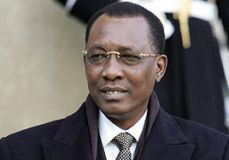Chad accuses Sudan of instigating coup attempt
April 13, 2006 (CAIRO) — Chad accused Sudan Thursday of engineering the ongoing military offensive by dissident forces to unseat President Idriss Deby, an allegation echoed in Sudan by the Darfur rebels but denied by the government.
 “We have always said there was a premeditated aggression from Khartoum against Chad,” Foreign Minister Ahmat Allami said.
“We have always said there was a premeditated aggression from Khartoum against Chad,” Foreign Minister Ahmat Allami said.
“What we have been witnessing over the past 72 hours is only the continuation of the Khartoum regime’s aggressive policies against Chad,” he said in Cairo after a meeting with his Egyptian counterpart Ahmed Abul Gheit.
Fighting escalated Thursday in Chad, as rebels closed in on the capital N’Djamena in their bid to unseat Deby.
Allami said Sudanese President Omar al-Beshir was using the dissident Chadian forces currently fighting government forces around N’Djamena as “cannon fodder”.
He stressed this was a violation of the agreement reached between Sudan and Chad in February, following talks sponsored by Libya and the African Union.
“Chad is standing by its commitments. It is Sudan’s duty to do the same thing,” he added.
The Sudanese rebels from Darfur also accused Khartoum of engineering the coup attempt against Deby in a bid to crush their three-year-old uprising.
“There is no question about it, the rebel offensive against Deby was engineered in Khartoum,” said Ahmed Hussein, a senior negotiator for one of the two main rebel movements in Darfur.
However, Khartoum reiterated denial of its involvement, describing it as an internal affair.
“What is presently being experienced by Chad between its government and opposition forces is a domestic affair,” Sudanese ruling National Congress Deputy Chairman Nafie Ali Nafie told reporters.
“The Sudanese government has no hand in the present armed clashes in Chad,” he said, adding that he hoped the incidents “will not affect the process of negotiation between the (Sudanese) government and the Darfur armed movements in Abuja.”
Sudanese Foreign Minister Lam Akol Ajawin also denied any link between Sudan and the current fighting in Chad, saying: “We hope stability will prevail in Chad because instability adversely affects the security situation in the Sudan.”
The UN refugee agency said it had been forced to reduce staffing levels in some field offices in the east and appealed for calm.
“I urgently appeal to all sides in this political upheaval to respect the civilian character of the refugee camps and to leave in peace those who have already fled the terrors of Darfur,” said UNHCR’s Antonio Guterres.
Darfur, a region in western Sudan roughly the size of France, shares a long border with Chad and has been the scene of fierce fighting and a dire humanitarian crisis since rebels there rose up against Khartoum in 2003.
The repression of their rebellion by the regime in Khartoum — which the United States has described as genocide and has pushed some 200,000 refugees into Chad — has strained relations between the neighbouring governments.
Both sides have traded accusations of supporting the other’s rebels but Chad and Sudan had officially agreed to cease hostilities on the border after signing in February a deal sponsored by Libya and the African Union.
“Khartoum supports the Chadian rebels, financially, politically and militarily,” Hussein told AFP from Abuja, where his Justice and Equality Movement has been involved in fruitless talks with the Sudanese government.
Khartoum has repeatedly accused Chad of supporting the Darfur rebels, who are complaining of marginalisation and want a better share of the country’s resources.
Deby himself is from the Zaghawa tribe, which straddles the border and is a dominant force in the Darfur rebellion. The military commander of the Sudan Liberation Movement — Darfur’s other rebel group — is from the same tribe.
“The government of Sudan wants to change the regime in Chad in order to crush the (Darfur) rebellion. Khartoum has always considered Chad and Darfur as one single front,” Hussein said.
“But whether we have support or not in Chad… our cause is legitimate and we will continue our struggle,” Hussein added.
A military official in Chad said Thursday that dissident Chadian forces had managed to enter the capital but Deby himself said the situation was “completely under control.”
Deby, a former armed forces chief, took power in a military coup after invading from Sudan in 1990, a year after Beshir himself seized power in a coup.
Deby survived what he described as a mutiny in 2004 and recently sacked some 70 officers from his army, who sought refuge in Sudan’s Darfur and organised a rebel movement aimed at toppling him.
France — which currently has close to 1,400 troops in Chad — said it was not involved in any military activity and denied rebel claims that its fighter jets had bombed positions in the east of the country.
(ST/AFP)
